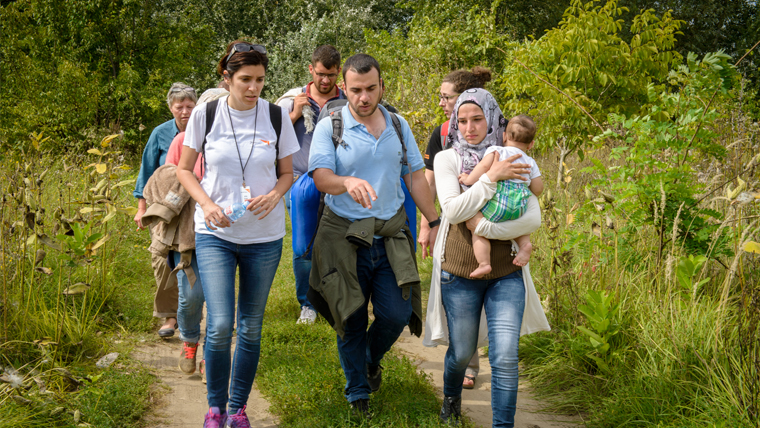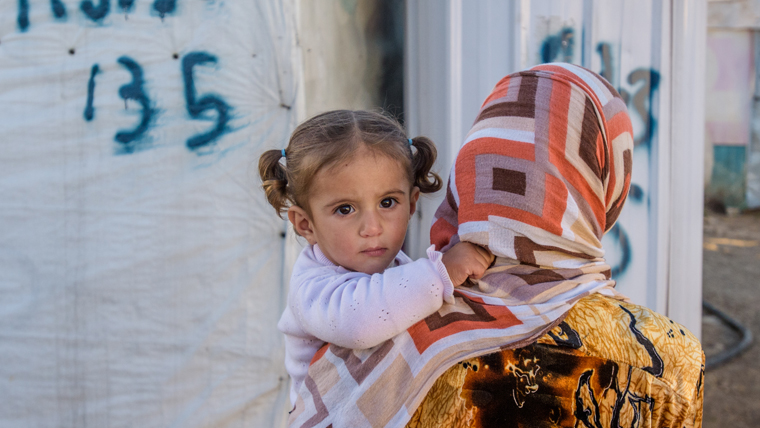A view from the other side : refugees in the West
By Erica Hall, Senior Child Rights Policy Adviser, World Vision UK
I have been watching the evolution of the rhetoric on refugees with great interest, and also incredible sadness. Professionally, I have spent many years advocating for the rights of children affected by armed conflict and making sure their voices are heard. On a personal level, refugees from a range of countries have come in and out of my life since I was young. Here are a few things I have learned from them:

World Vision Communications Officer Aida Sunje walks with refugees travelling on foot through Serbia during autumn 2015. Aida herself was once a refugee during the conflict in Bosnia in the 1990s.
- ‘No one chooses to be a refugee’ – words I recently heard from a former colleague in Bosnia, who fled her homeland during the conflict of the 1990s and later returned to help rebuild her country. Families do not take the decision to leave home lightly. They leave because they need to – in order to survive.
- We do have room – people often say that we can’t take refugees - that we don’t have the space or the resources. This I can refute from my personal experience. Back in the 1980s, when I was a teenager, my community and my family agreed to take in refugees fleeing the conflict in Cambodia. My family was not rich; in fact we were only just about getting by.
- But the family we sponsored had nothing. They arrived with just the clothes on their backs and a few small possessions. We took them in for one simple reason: it was the right thing to do; it was the moral thing to do. These three human beings – Chantha, Chiuin and three-year-old Do – needed help. They needed a roof over their heads, food, an opportunity to rebuild their lives and a bit of kindness.
- Overnight, our household of five nearly doubled. It was not always smooth sailing, but not one of us ever regretted the decision to help Do and his family, or the other Cambodian families who moved into our town. Thanks to social media, I recently reconnected with that three-year-old boy, all grown up now and living back in Cambodia. He will always be part of our family, and I am grateful for the opportunity to remember those wonderful times together.

Syrian refugee Mahal carries her one-year-old daughter Khouloud back to their tent in an Informal Tented Settlement, in Lebanon's Bekaa Valley. Mahal and her husband first fled from Syria almost five years ago.
3. And that brings me to the next lesson: refugees can enrich our lives – I learned so much from Chantha, Chiuin and Do, despite the language and cultural obstacles. They had a significant impact on who I am today, on the career I have chosen and on the way I live my life. On a broader level, for every negative refugee tale, we can find a ‘success’ story: both Jesus and Muhammad were refugees. Mo Farah, four-time Olympic gold medallist, came to the UK as a refugee when he was eight. Scientist Albert Einstein; painter Lucian Freud; singers Rita Ora, Freddie Mercury and Mika; models Alek Wek and Iman; and Marks & Spencer co-founder Michael Marks were all refugees. And let us not forget Anne Frank, a child refugee who continues to teach us about hope and humankind.
The pope’s World Day for Refugees is a time to celebrate the contributions of refugees, and to rediscover our humanity. It’s my hope that we will eventually get to a place where we will find a place for all of the children like Do, who just want to feel safe and loved.
You can find out more about World Vision UK’s work with Syrian and South Sudanese refugees on our emergencies page here.